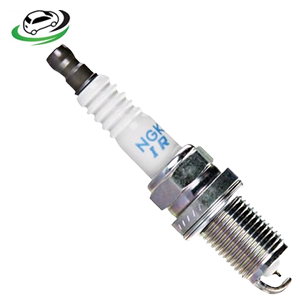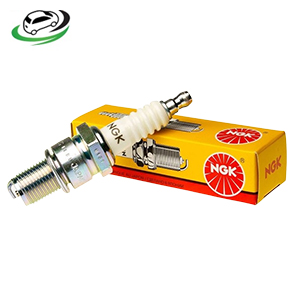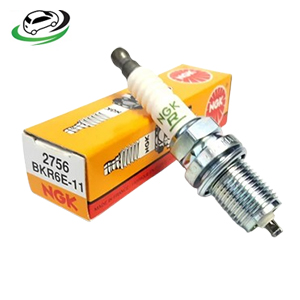-20%
Get NGK Spark Plug Various BKR6E-11
Spark plugs are critical components in the ignition system of internal combustion engines. They play a vital role in igniting the air-fuel mixture within the engine’s cylinders, thereby enabling the engine to generate power. Here’s a comprehensive overview of spark plugs, covering their function, types, importance, maintenance, and selection criteria.
Importance of Spark Plugs
- Ignition: The primary function of a spark plug is to generate a high-voltage electrical spark to ignite the compressed air-fuel mixture in the combustion chamber. This ignition process initiates the combustion cycle, allowing the engine to generate power.
- Engine Performance: Spark plugs directly influence engine performance by ensuring proper combustion of the air-fuel mixture. A well-functioning spark plug promotes efficient combustion, leading to smoother engine operation, increased power output, and improved throttle response.
- Fuel Efficiency: Efficient combustion facilitated by spark plugs leads to better fuel efficiency. When the air-fuel mixture ignites and burns completely, more energy is extracted from the fuel, resulting in improved fuel economy and reduced fuel consumption.
- Emissions Control: Spark plugs play a crucial role in controlling engine emissions by promoting clean and complete combustion. Proper combustion reduces the production of harmful pollutants such as hydrocarbons (HC), carbon monoxide (CO), and nitrogen oxides (NOx), helping vehicles comply with emissions regulations.
- Cold Start Performance: Spark plugs are essential for reliable engine starting, especially in cold weather conditions. They provide the initial spark needed to ignite the air-fuel mixture during engine startup, ensuring smooth and quick starts even in low-temperature environments.
- Engine Reliability: Well-maintained spark plugs contribute to engine reliability and longevity. They ensure consistent ignition performance, preventing misfires, rough idling, and other performance issues that can lead to engine damage or premature wear of engine components.
- Durability: Modern spark plugs are designed to withstand the harsh conditions within the combustion chamber, including high temperatures, pressures, and chemical exposure. They are built to be durable and resistant to wear, erosion, and fouling, ensuring reliable performance over an extended service life.
- Compatibility: Spark plugs are available in various configurations, heat ranges, and electrode designs to fit a wide range of vehicle makes and models. This compatibility ensures that drivers can find the right spark plugs for their specific engine requirements and performance preferences.
- Technology Advancements: Advancements in spark plug technology, such as platinum, iridium, and multi-electrode designs, have further enhanced their performance, longevity, and reliability. These innovative spark plugs offer improved ignition performance, reduced maintenance, and better overall engine efficiency.
Types of Spark Plugs
- Copper Spark Plugs:
- Composition: Feature a solid copper core with a nickel alloy coating.
- Pros: Excellent conductivity and affordability.
- Cons: Shorter lifespan, requiring more frequent replacements.
- Platinum Spark Plugs:
- Composition: Have a platinum disc welded to the center electrode.
- Pros: Longer lifespan than copper plugs, better fuel efficiency.
- Cons: More expensive than copper plugs.
- Double Platinum Spark Plugs:
- Composition: Platinum discs on both the center and ground electrodes.
- Pros: Enhanced durability and performance.
- Cons: Higher cost.
- Iridium Spark Plugs:
- Composition: Feature an iridium tip on the center electrode.
- Pros: Superior performance and longevity due to the high melting point of iridium.
- Cons: Most expensive among common spark plugs.
- Iridium Platinum Spark Plugs:
- Composition: Combine an iridium tip on the center electrode with a platinum tip on the ground electrode.
- Pros: Exceptional durability, performance, and efficiency.
- Cons: Premium cost.
- Laser Platinum Spark Plugs:
- Composition: Feature platinum electrodes with precision laser welding.
- Pros: Enhanced durability, efficient ignition, and consistent performance.
- Cons: Higher cost due to advanced manufacturing techniques.
Maintenance and Replacement
- Inspection: Regularly check spark plugs for wear, carbon buildup, and correct gap settings.
- Replacement Interval: Follow the vehicle manufacturer’s guidelines, typically ranging from 20,000 to 100,000 miles depending on the type of spark plug.
- Symptoms of Worn Spark Plugs:
- Difficulty starting the engine.
- Rough idling or engine misfires.
- Decreased fuel efficiency.
- Poor acceleration.
Choosing the Right Spark Plugs
- Manufacturer’s Recommendation: Always start with the vehicle manufacturer’s specified spark plug type and model.
- Heat Range: Choose the correct heat range to match the engine’s operating conditions, preventing fouling or pre-ignition.
- Gap Setting: Ensure the spark plug gap is set to the manufacturer’s specifications for optimal performance.
Follow us on Facebook for more parts.



